- Home
- Jim Thompson
The Kill-Off Page 4
The Kill-Off Read online
Page 4
The girl started toward the bandstand. There was a small burst of hand-clapping and stein-thumping. And my eyes snapped open and my heart pounded, and I half rose out of my chair. And then I settled back down again. Because, of course, it wasn’t Janie. Janie wouldn’t be in a joint like this, she wouldn’t be hanging around with barflies. Anyway, I knew where Janie was, at home looking after the boys, whoring and guzzling and…
Janie was back in New York. I’d talked to her long-distance that night—had her sing to me over the telephone. It was Melancholy Baby, one of our all-time hit recordings, one of the dozen-odd which still sell considerably—and thank God they do. Although I don’t know who the hell buys them. Probably they all go to insane asylums, the patients there. It must be that way, the poor devils must all be locked up, since there seems to be nothing on the outside any more but tone-deaf morons.
Why, goddammit, I talked to a man a while back, one of those pseudo-erudite bastards who is mopping up with articles about modern “music,” the so-called up-beat, “cool” crap. I said, let me ask you something. Suppose the printer started “interpreting” your articles. Suppose he started leaving out lines and putting in his own, suppose he threw away your punctuation and put in his own. How would you feel if he did that, an “interpretation” of your stuff?
I shouldn’t have wasted my time on him, of course. I shouldn’t even have spit on him. He called himself a music critic—a critic, by God!—and he’d never heard of Blue Steele!
The girl didn’t look like Janie. Not the slightest. I’d only thought she did at the time.
She sang. It was Don’t Get Around Much Any More, another old hit of Janie’s and mine. And she bitched it up. Brother, did she bitch it! But when I closed my eyes…
She had a voice. She had what it took, raw and undeveloped as it was. And she hit you. That’s the only way I can say it—she hit you. She brought out the goosebumps, like that first blast of air when you step into an air-conditioned room.
And God knows I don’t expect much. I work for something good, I do my best to get it. But I don’t really expect it.
I began to get a little excited. I did some fast mental calculations. I was working single at the moment, doing a series of club dates. And I was just squeaking by. But the resort season wasn’t too far off, and I had some recording checks due; and it would be easy enough to whip together another band. I could just about swing it, I thought. A five man combo, including myself, and this girl. I couldn’t make any money with it, not playing the music. I’d be very lucky, in fact, if I could break even. But I could do it—do something, by God, that needed to be done. Give this mixed-up world something that it ought to have, regardless of whether it knew it or wanted it.
She finished the song. She was at my table before I could motion to her. I was still wrapped up in my calculations. I heard her pitch, but it was a minute or two before it sank in on me. And perhaps I should have expected it; and perhaps, by God, I should not have. From some girls, yes. From any other girl. But not her, not someone with the music in them.
I wanted to spit on her. I wanted to break my stein, slash her throat with it so that she would never sing another word. Instead, I said, fine: I hated sleeping by myself.
I suppose my expression had startled her. At any rate, she drew back a little. She didn’t mean that, she said. All she meant was that maybe I could buy her dinner some place and we could have a nice visit, since she was alone, too, and maybe I could help her buy a new dress because a drunk had spilt some beer on this one, and—
She was really a nice girl. She told me so herself. She was just doing this (temporarily, of course!) because her mother was awfully sick—a sick mother, no less!—and she had a couple of younger brothers to support, and her father was dead and crops had been awfully bad on this farm she came from. And so on, ad infinitum, ad nauseam. The only thing she spared me was the fine-old-Southern-family routine. If she’d pulled that I think I would have killed her.
I took a couple of twenties out of my wallet and riffled them.
She simpered around a little more, and then she went back to my hotel with me.
I looked at her, and suddenly I turned and ducked into the bathroom. I hunched over, hugging my stomach, feeling my guts twist and knot themselves, wanting to scream with the pain. I puked, and wept silently. And it was better, then. I washed my face, and went back into the bedroom.
I told her to get her clothes on. I told her what I could and would do for her.
All the clothes she’d need; good clothes. A year’s contract at two hundred dollars a week. Yes, two hundred dollars a week. And a chance to make something of herself, a chance eventually to make two thousand, five thousand, ten thousand. More than a chance, an absolute certainty. Because I would make something of her; I would not let her fail.
She believed me. People usually do believe me if I care to make the effort. Still, she hung back, apparently too shocked by the break I was offering her to immediately accept it. I gave her twenty dollars, promised her another twenty to meet me at the club in the morning. She did so—we had the place to ourselves except for the cleaning people—and I gave her a sample of what I could do for her.
A good sample, because I wanted her firmly hooked. With what I had in mind, the two hundred a week might not be enough to hold her. That invalid mother and two brothers et cetera, notwithstanding. I wanted to give her a glimpse of the mint, boost her high enough up the wall so that even a whoring moron such as she could see it.
And I did.
I worked with her a couple hours. At the end of that time, she was no longer terrible, but merely bad. Which to her, of course, seemed nothing less than wonderful.
She was beaming and bubbling, and the sun seemed to have risen behind her eyes.
“I can hardly believe it!” she said. “It seems kind of like magic—like a beautiful dream!”
“The dream will get better,” I said. “It will come true. Assuming, that is, that you want to accept my offer.”
“Oh, I do! You know I do,” she said. “I don’t know how to thank you, Mr. McGuire.”
I told her not to bother; she didn’t owe me any thanks. We went back to my room, and I closed and locked the door.
She seemed to crumple a little, grow smaller, and the sun went out of her eyes. She stammered, that she wouldn’t do it, then that she didn’t want to. Finally, as I waited, she asked if she had to.
“I’ve never done anything like that before. Honestly, I haven’t, Mr. McGuire! Only once, anyway, and it wasn’t for money. I was in love with him, this boy back in my home town, and we were supposed to be married. And then he went away, and I thought I was pregnant so I left, and—”
“Never mind,” I said. “If you don’t want to…”
“And it’ll be all right?” She looked at me anxiously. “You’ll still—s-still—?”
I didn’t say anything.
“W-Will it? Will it, Mr. McGuire? Please, please! If you only knew…”
If I only knew, believed, that she was really a good girl. If I only knew how much she wanted to sing, how much this meant to her. You know.
I shrugged, remained silent. But inside I was praying. And what I was praying was that she would tell me to go to hell. I could have got down and kissed her feet for that, if she had insisted on being what the good Lord had meant her to be or being nothing; keeping the music undefiled or keeping it silent where it was. If only it had meant that much to her, as much as it meant to me—
And it didn’t. It never means as much, even a fraction as much, as it means to me. Not to Janie. Not to anyone.
No one cares about the music.
Except for me it would vanish, and there would be no more.
Slowly, she unbuttoned her dress. Slowly, she pulled it down off one shoulder. I stared at her, grinning—wanting to yell and wanting to weep. And blackness swam up on me from the floor, dropped down over me from above.
I came out of it.
She was kneeling in front of me. My head was against her, and she was wet with my tears. And she was crying, and holding me.
“Mister McGuire…W-what’s the matter, M-Mist—Oh, darling, baby, honey-lamb! What can I—”
She brushed her lips against my forehead, stroked my hair, whispering:
“Better now, sweetheart? Is Danny’s dearest honey-pie bet—”
“You rotten, low-down little whore,” I said.
Pete Pavlov was waiting at the station when we came in late Thursday night. The boys and Danny went on down to their cottages, and I went to his office with him.
I like Pete. I like his bluntness, his going straight to the point of a matter. There is no compromise about him. He knows what he wants and he will take nothing else, and whether it suits anyone else makes not the damnedest bit of difference to him.
He did not ask about Janie, nor the why of the new band. That was my business, and Pete minds his own business. He simply poured us a couple whopping drinks, tossed me a cigar and asked me if I knew where he could lay his hands on a fast ten or twenty thousand.
I said I wished I did. He shrugged and said he didn’t really suppose I would, and just to forget he’d said anything. Then he said, “Excuse me, Mac”—Pete has always called me Mac—“Know I didn’t need to tell you to keep quiet.”
“That’s okay,” I said. “Things pretty bad, Pete?”
He said they were goddamned bad. So bad that he’d fire his hotels if he could collect on them. “Those goddamned insurance companies,” he said. “Y’know, I figure that’s why so many people get burned to death. Because the companies won’t pay off on empty buildings. Guess I should have fired mine while they were open, but I kind of hated to take a chance on roasting someone.”
I laughed,
and shook my head. I hardly knew what to say. I knew what I should say, but I wasn’t quite up to saying it, hard-pressed as I was.
He went on to explain his situation. He’d never borrowed any money locally. He’d always done business on a cash basis. Then, when things began to tighten up, he’d gone to some New York factors; and now the interest was murdering him.
“No usury laws when it comes to business loans, y’know. Did you know that? Well, that’s the way she stands. I don’t get up ten, twenty thousand, I’m just about going to be wiped out.” He took a chew of tobacco, grunted sardonically. “Own damned fault, I guess. Too goddamned stubborn. Should have unloaded when things first started slipping.”
“You couldn’t have done it, Pete,” I said. “If you knew how to give up, you’d never have got to where you are.”
He said he guessed that was so. Guessed he didn’t know how to lay down, and didn’t want to learn.
“Pete,” I said. “Look. Your contract is with the agency, and I can’t cut the price. But I can rebate on it.”
“Hell with you,” he said. “You ugly, ornery over-grown bastard.”
He walked around the room, grunting that there were too damned many throats in need of cutting, without bleeding some dull-witted son-of-a-bitch like me who ought to have a guardian looking after him.
“Nope,” he said, turning back around. “I ain’t that bad off. If I was, I just wouldn’t have signed up for you this year.”
“Maybe you shouldn’t have,” I said. “And look, Pete. You can’t break that contract, but if I should refuse to play—”
“Nope. No, now listen to me,” he said. “I wouldn’t do it, even if I didn’t like to listen to that damned pounding of yours. I got to keep the pavilion open. Once I closed it, it’d be kind of a signal. I might as well paint a bullseye on my butt, and tell ’em all to start kicking.”
We went on drinking and talking. Talking of things in general, and nothing much in particular. He said that when Kossmeyer came down the three of us ought to get together some night and have us a bull session. I said I’d like that—some time when I was feeling good and didn’t have anything on my mind.
“I like him,” I said. “He’s a hell of an interesting little guy, and a nice one. But sometimes, y’know, Pete, I get a feeling that he ain’t where I’m seeing him. I mean, he’s right in front of me, but it seems like he’s walking all around me. Looking me over. Staring through the back of my head.”
Pete laughed. “He gives you that feeling too, huh? Ain’t it funny, Mac? All the people there are in the world, and how many there are you can just sit down and cut loose and be yourself with.”
I said it certainly was funny. Or tragic.
“Well, hell,” he said, finally, “and three is seven. Daddy’s gone and went to heaven. Guess you and me ought to be getting some sleep, Mac.”
We said good-night, and he went off toward town, his chunky body moving in a straight line. I went to my cottage, feeling conscience-stricken and depressed by my failure to help him. By my failures period. Bitch and botch, that was me. In common honesty I ought to start billing myself that way: Bitch And Botch And His Band And Bitch. I could work up a theme song out of it, set it to the melody of—well, Goodie Goodie. Let’s see, now. Tatuh ta ta tum, tatuh…I worked on that for a minute, and then swore softly to myself. I couldn’t do anything right any more. Not the simplest, damnedest ordinary thing.
Take tonight, for example. My people were new here; there are rows and rows of cottages, all exactly alike. Yet I hadn’t bothered to see that they got to the right ones, to see that they were comfortably settled. I’d just gone my own merry way—thinking only of myself—and to hell with them.
It didn’t matter, of course, about Danny Lee. She could sleep on the beach for all I cared. But my men, poor bastards, were a different matter. They had enough to bear as it was—those sad, sad bastards. Just barely squeaking by, year after year. Working for the minimum, and tickled to death to get it. Big-talking and bragging, when they know—for certainly they must know—that they were unfitted to wipe a real musician’s tail.
It must be very hard to maintain a masquerade like that. I felt very sorry for them, my men, and I was very gentle with them. They had no talent, nothing to build on, nothing to give. There can be nothing more terrible, it seems to me, than having nothing to give.
I unpacked my suitcases, and climbed into bed.
I fell asleep, slipping almost immediately into that old familiar dream where everyone in the band was me. I was on the trumpet, the sax-and-clarinet. I was on the trombone, at the drums, and, of course, the piano. All of us were me—the whole combo. And Danny Lee–Janie was the vocalist, but she-they were also me. And it was not perfect, the music was not quite perfect. But it was close, so close, by God! All we-I needed was a little more time—time is all it takes if you have it to work with—and…
I woke up.
It was a little after twelve, noon. The smell of coffee drifted through my window, along with snatches of conversation.
It came from the boys’ cabin—they were batching together to save money. They were keeping their voices low, and our cottages, like the others, were thirty feet apart. (“Don’t like to be crowded,” Pete told me, “and don’t figure anyone else does.”) But sound carries farther around water:
“Did you hear what he said to me, claimin’ I had a lip? Why, goddammit, I been playin’ trumpet…”
“Hell, you got off easy! What about him asking me if I had rheumatism, and I needed a hammer to close the valves…?”
“The wildeyed bastard is crazy, that’s all! I leave it to you, Charlie. You ever hear me slide in or off a note? I ever have to feel for ’em? Why…”
They were all chiming in, trying to top one another. But the drummer finally got and held the floor. I listened to his complaints—the bitter low-pitched voice. And I was both startled and hurt.
Possibly I had seemed a little sharp to the others, but I certainly hadn’t meant to. I had only been joking, trying to make light of something that could not be helped. With the drummer, however, I had been especially gentle—exceedingly careful to do or say nothing that might hurt his pride. He had nothing at all to feel bitter about that I could see.
It was true that I had joked with him, but in the mildest of ways. I had not so much corrected him as tried to get him to correct himself.
I had tossed him a bag of peanuts on one occasion. On a couple of others I had suddenly held a mirror in front of him, at the height of his idiotic, orgiastic contortions. I had had him look at himself, that was all. I had said nothing. It was pointless to say anything, since English was even more than a mystery to him than music, and I saw no necessity to. It seemed best simply to let him look at himself—at the man become monkey. And how that could possibly have made him sore, why he should blame me for the way he looked…
Well, the hell with it. He wasn’t worth worrying about or bothering with. None of them were. Only Danny Lee—Danny Lee’s voice. I wished to God I could have gotten hold of her a couple of years sooner. By now, she’d have been at the top, so good that she wouldn’t have been caught dead in a place like this.
I shaved and bathed and dressed. I walked over to her cottage, and told her to show at the pavilion at two o’clock sharp.
Then I dropped in on the boys.
They saw or heard me coming, for their voices rose suddenly in awkward self-conscious conversation. I went in, and there was a stilted exchange of greetings, and a heavy silence. And then two of them offered me coffee at the same time.
I declined, said I was eating in town. “By the way,” I added. “Can I do anything for you guys in town? Mail some letters to the local for you?”
They knew I’d heard them then. I looked at them smiling, one eyebrow cocked; glancing from one sheepish, reddening, silly face to another.
No one said a word. No one made a move. They almost seemed to have stopped breathing. And I stared at them, and suddenly I was sick with shame.
I mumbled that everything was Jake. I told them they’d better get out and have some fun; to rent a boat, buy some swim trunks—anything they needed—and to charge it to me.
“No rehearsal today,” I said. “None any day.”

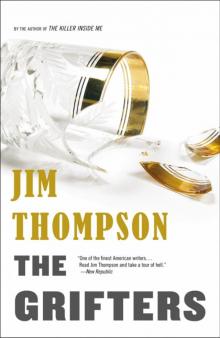 The Grifters
The Grifters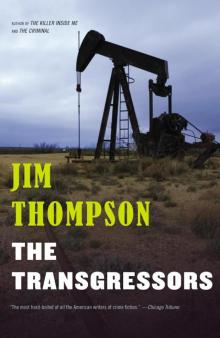 The Transgressors
The Transgressors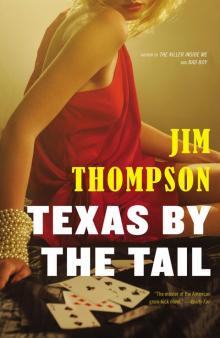 Texas by the Tail
Texas by the Tail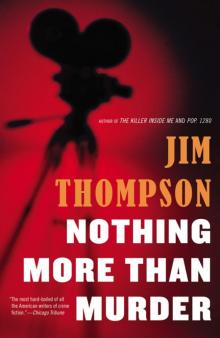 Nothing More Than Murder
Nothing More Than Murder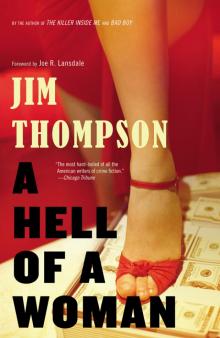 A Hell of a Woman
A Hell of a Woman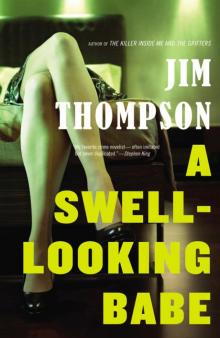 A Swell-Looking Babe
A Swell-Looking Babe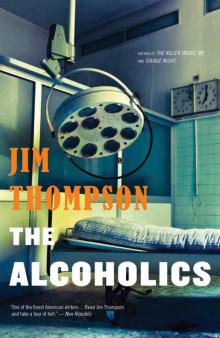 The Alcoholics
The Alcoholics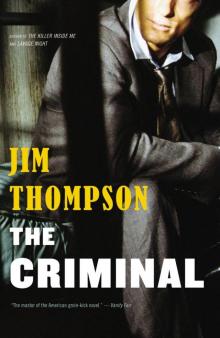 The Criminal
The Criminal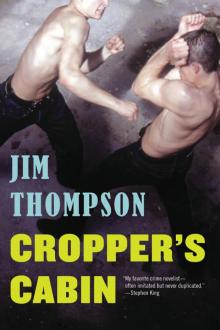 Cropper's Cabin
Cropper's Cabin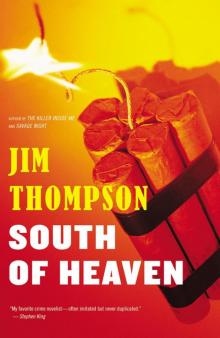 South of Heaven
South of Heaven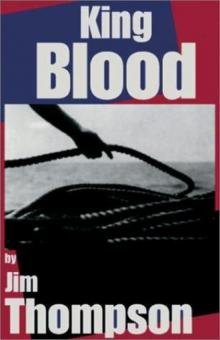 King Blood
King Blood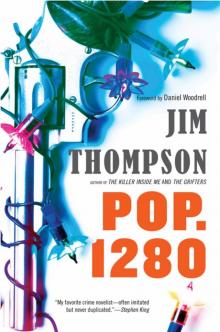 Pop. 1280
Pop. 1280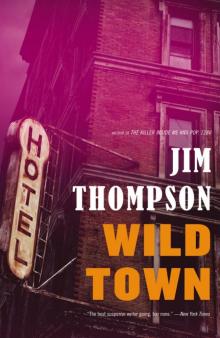 Wild Town
Wild Town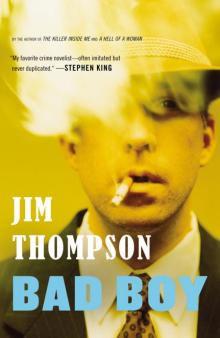 Bad Boy
Bad Boy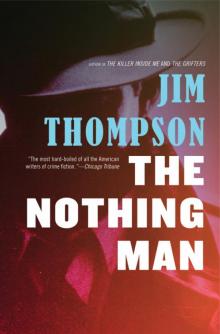 The Nothing Man
The Nothing Man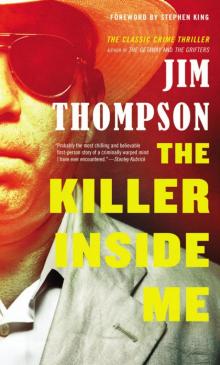 The Killer Inside Me
The Killer Inside Me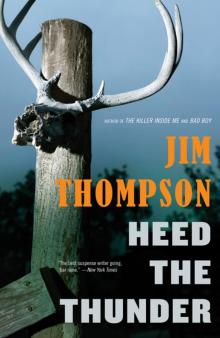 Heed the Thunder
Heed the Thunder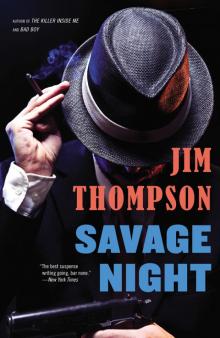 Savage Night
Savage Night Recoil
Recoil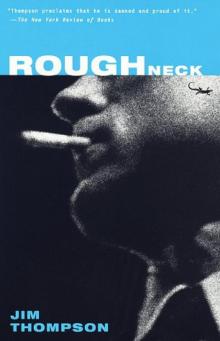 Roughneck
Roughneck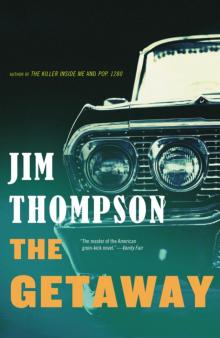 The Getaway
The Getaway